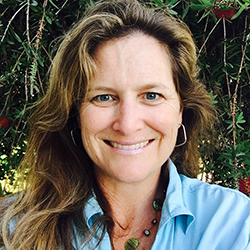Certificate
Climate Resilience Certificate for Professionals
Translate Knowledge into Action!
The impacts of a changing climate are visible and increasing. Build your skills, knowledge, and networks to take effective action. The Climate Resilience Certificate prepares professionals to incorporate resilience strategies into planning, implementation, and evaluation in their business, nonprofit, community, or organization. At the conclusion of the certificate, participants will leave with specific knowledge and hands-on strategies to implement in their job and their communities.
This certificate is offered online through AU New England.
Program Overview
The RMA program embraces regenerative approaches that ensure the security of water, energy, and food resources for future generations. In every course you take at Antioch University as part of this degree program, the competencies and skills acquired will further enable you to analyze, assess, and help create strategies and solutions to create a sustainable, equitable, and resilient world. You will further refine or acquire a skill set, not only throughout your coursework but through experiential learning opportunities in your internship and capstone project. All your work while a student will culminate in a professional portfolio you can share with existing or future employment opportunities.
There are two ways to learn!
Apply Here for a Climate Resilience Certificate
Sign Up for an Individual Course

Christa Daniels
Director Resource Management & Administration and Climate Resilience Professional
Environmental Studies & Sustainability


Antioch University deepened my understanding of what different types of leadership look like: from courses taken to the professors I studied under, each gave me different but powerful examples of leadership.
Shameika Hanson, '20
Climate Adaptation Specialist
Centers and Resources
Additional Program Details
This graduate certificate requires at least nine (9) credits to complete. This certificate can be completed over three semesters. You can also complete the certificate over a longer period of time with a schedule that works for you. Each four-week course is designed to stand alone so that you may take courses in any order. These online courses can be completed in approximately 8 hours per week.
- ES 5810A Climate Change: The Science, Uncertainty and Risk(1 credit, 4 weeks
online) ** - ES-5820: Climate Impacts: Vulnerability and Adaptation Planning (1 credit,
4 weeks online) - ES-5830: Climate Impacts: Communication, Facilitation, and Stakeholder
Capacity Building (1 credit, 4 weeks online) - ES-6995: Climate Resilience Capstone (3-credits))
**If you have already taken or plan to take either ESC 5720 Earth Systems and Climate Change (3 credits) or ES 703 Global Environmental Change (3 credits) as an elective, then that course can be substituted for this particular degree requirement.
Elective Courses (3 Semester Credits)
Choose an elective course. See some of the available courses below:
- ES-5840: Business Resilience and Continuity (1 credit)
- ES-5850: Climate Response: Costs and Financing (1 credit)
- ES-5860: Climate Justice and Equitable Adaptation (1 credit)
- ES-5870: Climate Change: Public Health (1 credit)
- ES-5750: Climate Migration (1 credit)
- ESP-5100: Policy Advocacy: Climate Change (1 credit)
- ES-5171: Justice, Equity, and Environment (2 credits)
- Exper 5750 Climate Migration
- ES-5740 Climate Adaptive Housing
- New courses are being added based on climate resilience practitioner needs
- Clearly communicate an understanding of current approaches to both mitigation and adaptation at various scales of implementation.
- Effectively demonstrate an understanding of the interrelation between climate change, water, food, and energy security.
- Provide evidence of the ability to structure a vulnerability analysis.
- Articulate preferred adaptation strategies for identified vulnerabilities.
- Demonstrate how to judge the effectiveness of a message generated by either the scientific community or the media that targets decision-makers and the public about the risks associated with climate change.
- Analyze the effectiveness of a stakeholder engagement process designed to have decision-makers respond to a specific vulnerability.
- The Climate Resilience Certificate is geared toward individuals working on the ground in resource management, hazard mitigation, community planning, business, and organizational operations, as well as other professionals seeking to strengthen their knowledge of how to implement climate resilience.
- At the conclusion of the certificate, participants will leave with specific knowledge and hands-on strategies to implement in their job and their communities.
- This 9-credit certificate is designed to meet the needs of busy, working professionals with:
- Courses are taught online so that you may complete weekly assignments on your own schedule.
- You can start the program in any semester – Spring, Summer, or Fall.
- The 1-credit courses can be taken in any order.
- The certificate may be completed on a part-time basis.
- Complete a capstone project of your choice. The capstone could be directly relevant to your agency, community, business, or organization.
...to Make Their Communities, Organizations, and Themselves Equitable, Climate Resilient and Regenerative
You can find them in,
- Municipal Governments
- Regional Governments & Agencies
- Federal Agencies
- B-Corps
- Businesses
- International Governments
- Private Consulting Firms
- Environmental NGO’s
In roles such as,
- Resource Manager
- City Planner
- State Environmental Bureau Manager
- Senior Environmental Scientist
- Director of Economic Development
- Director of Community Development
- Sustainability Consultant
- Climate Resilience Coordinator
- Environmental Non-Profit Director
- Transportation Director
- Director of Sustainable Housing
- Senior Managers for Green Buildings & GI
- Director of Land Conservation
- Entrepreneur
Analyze an environmental problem from a holistic perspective, including all parts and relationships.
Envision equitable, sustainable, and climate-resilient future states in contrast to the ‘do-nothing’ scenarios.
Construct various scenarios about how the problem might play out in the future.
Design, create, and implement strategies and solutions to create an equitable, sustainable, and climate-resilient future.
Collaborate and partner with researchers from other disciplines and stakeholders in various organizations: government, businesses, and civil society.
Faculty Spotlights

Dawn Murray, PhD
Core Faculty

Running Grass
Faculty, Senior Lecturer

John Crockett
Lab and Herbarium Coordinator

Julia D. Gibson, PhD
PhD Program Director, Core Faculty
Admissions / Cost
Deadlines
| Program | Term | Deadline |
|---|---|---|
| Environmental Studies Certificates | Summer | April 15 |
| Fall | July 15 | |
| Spring | December 1 |
How to Apply
- Complete the online admissions application, including the following:
- Resume/curriculum vitae (CV)
- Official transcripts from all colleges or universities where you earned a degree or certificate.
- email transcripts to [email protected], or
- mail to:
Office of Admissions
Antioch University New England
40 Avon Street
Keene NH 03431-3516
- Non-refundable $50 application fee
- There are additional requirements for International applicants and applicants without a Bachelor's degree
- Master’s and Certificate Programs do not require the GRE or any other standardized test for admissions. We consider all of your application materials and evaluate your academic potential in a variety of ways.
Official transcripts should be emailed to [email protected] or mailed to:
Office of Admissions
Antioch University New England
40 Avon Street
Keene, New Hampshire 03431-3516
All application materials submitted become part of an applicant’s file and cannot be returned.
LEARN MORE
Questions about the Admissions process? Contact Admissions at [email protected]
Tuition & Financial Aid
A college education is an investment in your future. Let us help you understand the costs and explore the resources available to help make your college education even more affordable. The majority of AUNE students finance their education through some form of financial aid. You may not be sure which federal, state, public and private aid packages – such as loans, scholarships, and grants—are right for you. Our staff is here to help you, so you can focus on what’s most important: beginning your academic program at AUNE.
Cost
| Department/Program Name | Tuition Cost per Credit | Total Program Credits |
|---|---|---|
| Certificates: *with careful course selection all certificates are possible within the Environmental Studies MS degree requirements |
||
| Applied Spatial Analysis for GIS | $840 | 9 |
| Climate Change Education | $840 | 9 |
| Climate Resilience | $840 | 9 |
| Conservation Psychology | $840 | 9 |
| Environmental and Sustainability Education | $840 | 12 |
| Food Justice and Resilient Communities | $840 | 9 |
| Socially Responsible Organizational Leadership | $840 | 9 |
| Environmental Studies, Certificate | $840 | 9 |
| View the Cost of Attendance Components | ||

Start your Antioch Journey
Take your next step - talk to our admissions team to find the right program for you.
